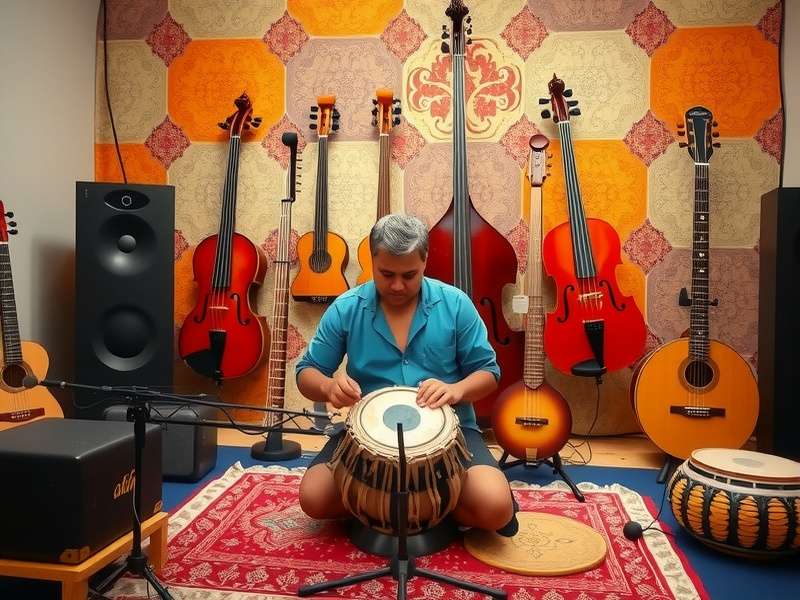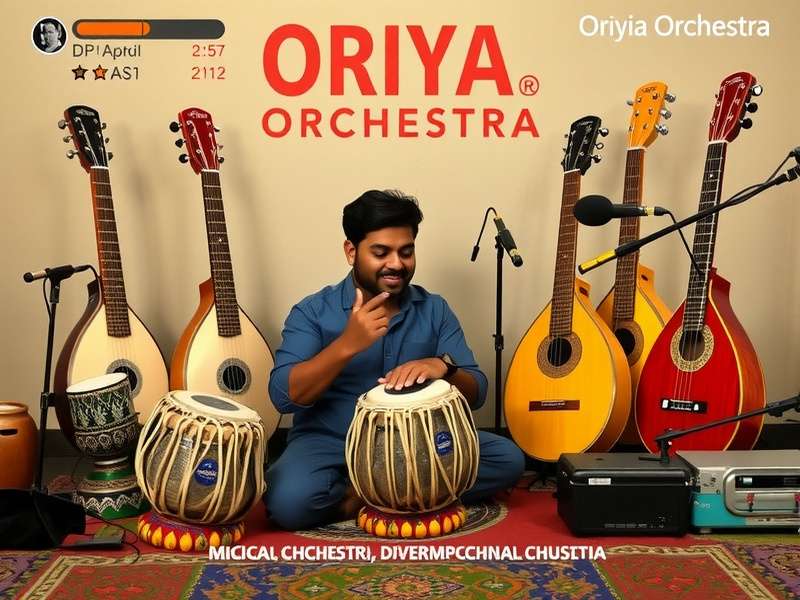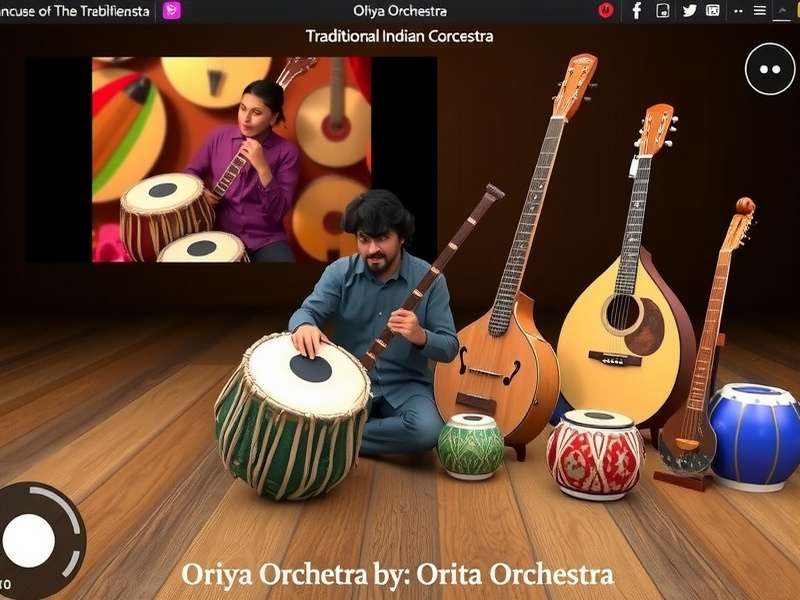Oriya Orchestra: The Ultimate Indian Musical Gaming Experience 🎵
Discover the rhythm of Odisha through this innovative music game that celebrates India's rich cultural heritage
Overview of Oriya Orchestra 🎮
Oriya Orchestrarepresents a groundbreaking fusion of traditional Indian music with modern gaming technology. This immersive experience transports players to the vibrant cultural landscape of Odisha, where they can explore the intricate rhythms and melodies that define the region's musical identity.
Developed by a team of passionate musicians and game designers,Oriya Orchestraoffers an authentic representation of Odisha's folk and classical traditions. Players engage with various musical challenges that test their rhythm, timing, and understanding of Indian musical structures.

The vibrant interface of Oriya Orchestra featuring traditional Indian instruments
The game stands out for its educational value, introducing players to concepts like tala (rhythmic cycles), raga (melodic frameworks), and the unique instruments of Eastern India. Through progressive difficulty levels, players develop a deeper appreciation for the complexity and beauty of Indian classical music.
🎯 Key Features:
- Authentic reproduction of traditional Odisha music
- Progressive learning system for Indian classical music concepts
- Multiplayer modes for collaborative musical experiences
- Extensive library of regional folk songs and classical compositions
Gameplay Mechanics and Structure 🎹
The core gameplay ofOriya Orchestrarevolves around rhythm-based challenges where players must tap, swipe, or hold in time with musical patterns. The interface presents a colorful representation of traditional Indian instruments that respond to player input with visual and auditory feedback.
Players begin with simple rhythms based on teen tal (16-beat cycle) and gradually progress to more complex patterns like jhaptal (10-beat cycle) and rupak tal (7-beat cycle). Each successful completion unlocks new instruments, songs, and cultural insights about Odisha's musical heritage.
🎵 Cultural Connection:
The game incorporates actual folk songs from Odisha's rural traditions, preserving musical forms that might otherwise be lost to modernization. Players encounter works from legendary Odia composers and learn about the historical context of each piece.
Advanced levels introduce improvisation elements, allowing players to create their own variations within the framework of Indian classical music rules. This creative aspect makesOriya Orchestranot just a game but a tool for musical expression and composition.

Players interact with virtual versions of traditional instruments like the tabla
Cultural Significance and Impact 🌍
Oriya Orchestraserves as an important cultural ambassador for Odisha's rich artistic traditions. By making these musical forms accessible through gaming, it introduces global audiences to aspects of Indian culture that are often overlooked in mainstream media.
The game has been praised by ethnomusicologists for its accurate representation of musical structures and its respectful approach to cultural material. It includes detailed information about the origins of each composition, the regional variations in performance practice, and the social contexts in which these musical forms developed.
Educational institutions have begun incorporatingOriya Orchestrainto their music curricula, using it to teach students about world music traditions. The game's approachable interface lowers barriers to understanding complex musical concepts that might otherwise seem intimidating to newcomers.
🏆 Recognition and Awards:
- Winner of "Best Educational Game" at India Game Developer Conference
- Featured in UNESCO's list of "Digital Preservation of Cultural Heritage" projects
- Recognized by the Government of Odisha for cultural promotion
Beyond entertainment,Oriya Orchestracontributes to the preservation of intangible cultural heritage. Many of the musical pieces included in the game were recorded from master musicians who are among the last practitioners of specific regional styles.
Traditional Instruments Featured 🪕
The game showcases an extensive collection of traditional Indian instruments, with particular emphasis on those native to Odisha. Each instrument is rendered with meticulous attention to detail, both visually and sonically.
Percussion Instruments
The percussion section includes the mardala (a double-headed drum similar to pakhawaj), the mahuri (a double-reed wind instrument), and gini (small cymbals). These instruments form the rhythmic foundation of Odissi music and are central to the gameplay experience.
String Instruments
String instruments featured include the vina, sitar, and the more regionally-specific gotuvadyam. Each instrument is playable in the game, with controls adapted to capture the unique playing techniques required for authentic sound production.

The diverse collection of Indian instruments available in Oriya Orchestra
Wind Instruments
The game includes wind instruments like the bansuri (bamboo flute) and shehnai, with breath control simulated through device sensors or alternative control schemes. This innovative approach to instrument interaction setsOriya Orchestraapart from other music games.
🎼 Educational Value:
Each instrument comes with detailed information about its construction, playing technique, historical development, and role in ensemble performance. This transforms the gaming experience into an immersive ethnomusicology lesson.
Development and Technical Innovation 🔧
The creation ofOriya Orchestrainvolved collaboration between game developers, musicians, musicologists, and cultural historians. The development team spent over two years researching Odisha's musical traditions before beginning production.
Technical innovations include a proprietary audio engine that accurately reproduces the microtonal variations essential to Indian classical music. The game's visual design draws inspiration from traditional Odia art forms like Pattachitra painting and appliqué work from Pipili.
The development team faced significant challenges in adapting complex musical concepts to accessible gameplay mechanics. Their solution was a progressive learning system that introduces musical theory gradually, contextualized within the framework of actual compositions.
🚀 Technical Highlights:
- Custom audio engine supporting 22-microtone scale system
- Motion capture of master musicians for authentic playing animations
- Procedural generation of musical patterns within traditional frameworks
- Cross-platform compatibility with consistent user experience
Future updates toOriya Orchestraplan to incorporate augmented reality features, allowing players to project virtual instruments into their physical environment. The development team also aims to expand the game's repertoire to include musical traditions from other regions of India.
🎉 Experience the Magic of Oriya Orchestra
Whether you're a gaming enthusiast, music lover, or cultural explorer,Oriya Orchestraoffers a unique journey into the heart of India's musical heritage. Download today and begin your rhythmic adventure!